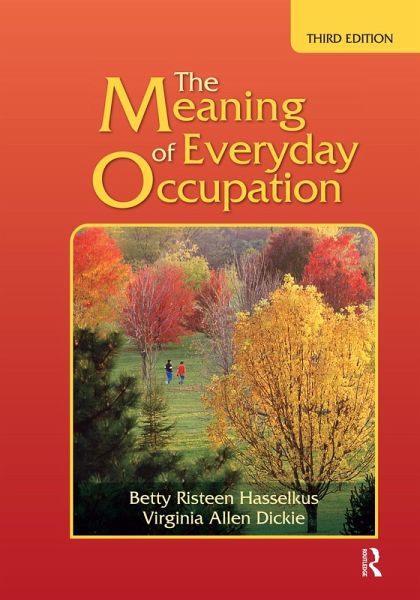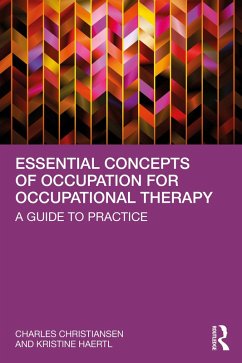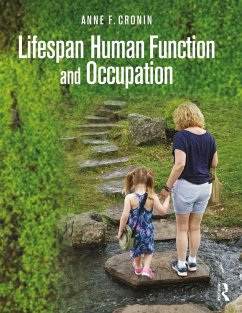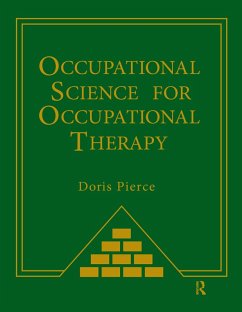
The Meaning of Everyday Occupation (eBook, PDF)
Versandkostenfrei!
Sofort per Download lieferbar
59,95 €
inkl. MwSt.
Weitere Ausgaben:

PAYBACK Punkte
30 °P sammeln!
Newly updated to address emerging directions in occupational therapy and occupational science, The Meaning of Everyday Occupation, Third Edition encourages occupational therapy personnel-students, educators, researchers, and practitioners-to recognize humans as occupational beings and to understand the meaning and significance of everyday occupation in day-to-day life. Written by award-winning and internationally known authors Drs. Betty Risteen Hasselkus and Virginia Allen Dickie, the Third Edition explores the concept of meaning as it relates to occupation in daily life. Each chapter is augm...
Newly updated to address emerging directions in occupational therapy and occupational science, The Meaning of Everyday Occupation, Third Edition encourages occupational therapy personnel-students, educators, researchers, and practitioners-to recognize humans as occupational beings and to understand the meaning and significance of everyday occupation in day-to-day life.
Written by award-winning and internationally known authors Drs. Betty Risteen Hasselkus and Virginia Allen Dickie, the Third Edition explores the concept of meaning as it relates to occupation in daily life. Each chapter is augmented by the authors' personal reflections, narratives from occupational therapists in practice, and quotations from participants in the authors' occupational research, creating a text in which the concepts and theories of occupation and occupational therapy come alive for the reader.
Themes in the Third Edition include:
Emphasizing occupation as experience, the comprehensive Third Edition champions the contributions of meaning to a client-centered approach to practice. This brings forward a new understanding of how to therapeutically affect the systems in which we all live and work.
The everyday occupation of our lives is often overlooked. By increasing the visibility of everyday occupation, The Meaning of Everyday Occupation, Third Edition offers readers the opportunity for personal reflection on day-to-day occupational patterns. By recognizing and acknowledging these patterns in their own lives, occupational therapy personnel can better understand how day-to-day occupation and disruption of that occupation affects the lives of clients.
Written by award-winning and internationally known authors Drs. Betty Risteen Hasselkus and Virginia Allen Dickie, the Third Edition explores the concept of meaning as it relates to occupation in daily life. Each chapter is augmented by the authors' personal reflections, narratives from occupational therapists in practice, and quotations from participants in the authors' occupational research, creating a text in which the concepts and theories of occupation and occupational therapy come alive for the reader.
Themes in the Third Edition include:
- Meaning in everyday life and its occupations
- Space and place as sources of meaning
- Culture in everyday occupation and in the context of therapy
- Well-being and development through everyday occupation
- Occupation as connection
- Disability and occupation
- Occupation and the human spirit
- Everyday creativity
Emphasizing occupation as experience, the comprehensive Third Edition champions the contributions of meaning to a client-centered approach to practice. This brings forward a new understanding of how to therapeutically affect the systems in which we all live and work.
The everyday occupation of our lives is often overlooked. By increasing the visibility of everyday occupation, The Meaning of Everyday Occupation, Third Edition offers readers the opportunity for personal reflection on day-to-day occupational patterns. By recognizing and acknowledging these patterns in their own lives, occupational therapy personnel can better understand how day-to-day occupation and disruption of that occupation affects the lives of clients.
Dieser Download kann aus rechtlichen Gründen nur mit Rechnungsadresse in A, B, BG, CY, CZ, D, DK, EW, E, FIN, F, GR, HR, H, IRL, I, LT, L, LR, M, NL, PL, P, R, S, SLO, SK ausgeliefert werden.













